Health
Drinking 100% orange juice is linked to surprising health benefits, study finds

Pure orange juice might have some unexpected benefits.
Researchers from Toronto Metropolitan University researched the effects of drinking 100% orange juice compared to a sugar-sweetened beverage (SSB), or “orange drink,” on appetite, food intake and glycemic response in adults.
The study was funded by the Florida Department of Citrus. It was published in the journal Nutrients and also surveyed emotions and sensory characteristics associated with the beverage.
APPLES VS. ORANGES: WHICH OF THESE FRUITS IS ‘BETTER’ FOR YOU?
Thirty-six “normal weight” adults were tasked with drinking either 100% orange juice, an orange drink or water before eating.
The researchers found that food and energy intake was lower in subjects who drank 100% orange juice compared to the orange drink.
“A little bit of orange seems to go a long way,” study co-author Nick Bellissimo told Fox News Digital. (iStock)
Caloric compensation from 100% orange juice was 84%, while the orange drink was −25%.
(Caloric compensation is the “regulation of energy intake by adjusting one’s intake based on previous consumption,” according to the National Institutes of Health.)
There was no significant difference in average appetite between the beverages, but blood glucose levels were lower after people drank the 100% orange juice.
HATE WATER? HERE ARE 5 HEALTHY ALTERNATIVES, ACCORDING TO AN NFL SPORTS DIETITIAN
“Rest-of-day blood glucose concentrations were lower after 100% orange juice compared with the orange drink and water control,” the study stated.
“In conclusion, consumption of 100% orange juice as a preload resulted in higher caloric compensation, lower total daily EI [energy intake], and lower blood glucose concentrations compared to the orange drink.”

The researchers’ hypothesis was that the flavonoids in 100% orange juice slow down the digestion and absorption of sugar. (iStock)
Study co-author Nick Bellissimo, associate professor of nutritional physiology at Toronto Metropolitan University, reacted to the findings in a statement to Fox News Digital.
While a “number of dietary guidelines” recommend reducing sugar intake from “all sources,” Bellissimo said, the findings suggested that 100% orange juice can be beneficial.
FITNESS DRINKS: SCIENTISTS WEIGH IN ON THE BENEFITS AND POTENTIAL RISKS OF INGREDIENTS
“Orange juice is similar to a sugar-sweetened beverage in that it contains free sugars, but it also contains sucrose (fructose and glucose bound together), while also containing vitamin C and flavonoids,” he noted.
The researchers’ hypothesis was that flavonoids in orange juice slow down the digestion and absorption of sugar.
“Thus, you are not seeing the same spike in blood glucose as you see with the SSB,” Bellissimo said.

Study participants who consumed orange drinks ate more calories at lunch than the 100% orange juice drinkers. (iStock)
“Interestingly, the energy in the orange juice was compensated for at the next meal – i.e., participants decreased their food intake at lunch by an amount similar to the energy in the orange juice – whereas participants ate more calories at lunch after consuming the SSB.”
Bellissimo confirmed that this effect on energy intake and glycemic response “persisted for the rest of the day.”
CLICK HERE TO SIGN UP FOR OUR HEALTH NEWSLETTER
“And participants consuming the orange juice actually consumed fewer calories, primarily by decreasing their carbohydrate intake,” he said.
“A little bit of orange seems to go a long way,” Bellissimo added.

People who drink 100% orange juice should mix it with some water for a more positive blood sugar result, a registered dietitian suggested. (iStock)
Ilana Muhlstein, a registered dietitian and nutritionist in Los Angeles, was not involved in the study but shared her thoughts on the study with Fox News Digital.
“The most important finding of the entire study is that the blood glucose concentrations were lower after 100% orange juice compared with an orange drink of the same calories, which shows that the body can recognize a difference between natural sugars and added sugars,” she said.
“The body can recognize a difference between natural sugars and added sugars.”
As a dietitian, Muhlstein said she is “constantly encouraging people to drink water,” especially prior to their meals, just as done in the study.
“It’s important to note that drinking water has a meaningful impact on lowering blood sugar levels,” she also pointed out.
“If someone wanted to drink orange juice, I would encourage them to stick with 100% orange juice, versus an ‘orange drink’ sweetened with sugar, and do their best to mix it with some water for a more positive blood sugar result.”
Fox News Digital reached out to the Florida Department of Citrus for comment.
For more Health articles, visit www.foxnews.com.com/health.

Health
“I Lost 130 lbs at Age 53!” — Here's the Protein Combo That Builds Muscle + Boosts Weight Loss

Sign Up
Create a free account to access exclusive content, play games, solve puzzles, test your pop-culture knowledge and receive special offers.
Already have an account? Login
Forgot your password?
Get back to the Sign In
Use left and right arrow keys to navigate between menu items.
Use escape to exit the menu.
Health
Cancer immunity gets a boost from one common nutrient, study finds: ‘Intrigue and optimism’

Vitamin D could be a surprise weapon against cancer, new research suggests.
A study of mice published in the journal Science last week found that eating a diet rich in vitamin D changed the gut microbiome in a way that boosted cancer immunity.
The micronutrient increased levels of the bacterium Bacteroides fragilis, which has been shown to improve cancer immune response.
BE WELL: PREPARE A DINNER RICH IN VITAMIN D FOR GOOD HEALTH
The mice that received vitamin D showed improved responses to cancer immunotherapy and greater immunity to new tumor development, according to researchers at the Francis Crick Institute in London, the National Cancer Institute (NCI) of the U.S. National Institutes of Health (NIH), and Aalborg University in Denmark.
“What we’ve shown here came as a surprise — vitamin D can regulate the gut microbiome to favor a type of bacteria that gives mice better immunity to cancer,” said senior study author Caetano Reis e Sousa, head of the Immunobiology Laboratory at Crick, in a press release.
Dietary vitamin D, found in foods including salmon, increased levels of the bacterium Bacteroides fragilis, which has been shown to improve cancer immune response. (iStock)
“This could one day be important for cancer treatment in humans.”
The researchers aren’t yet sure why vitamin D seems to foster a “good” microbiome.
WHY IMMUNOTHERAPY IS EMERGING AS THE ‘FOURTH PILLAR’ OF CANCER TREATMENTS, EXPERTS SAY
“If we can answer this, we might uncover new ways in which the microbiome influences the immune system, potentially offering exciting possibilities in preventing or treating cancer,” said co-author Evangelos Giampazolias, former postdoctoral researcher at the Crick and now group leader of the Cancer Immunosurveillance Group at the Cancer Research UK Manchester Institute, in the release.

Previous studies have linked vitamin D to improved immunity against cancer. (iStock)
Shama Farooq, M.D., a neuro-oncologist at Hackensack Meridian Neuroscience Institute at Jersey Shore University Medical Center, was not involved in the study but shared his comments on the findings.
“As a doctor who treats patients with cancer, my initial reaction to this study was one of intrigue and optimism,” he told Fox News Digital.
IN POTENTIAL CANCER BREAKTHROUGH, NEWLY FOUND ‘KILL SWITCH’ TRIGGERS DEATH OF CANCER CELLS: ‘ONE-TWO PUNCH’
“The findings suggest a potential link between vitamin D levels, the microbiome and cancer immunity, offering potential new avenues for improving cancer treatment and prevention strategies.”
Continued research into improving the body’s immunity against cancer is “crucial,” Farooq noted.
“Cancer is a complex disease with diverse mechanisms of evasion,” he said.
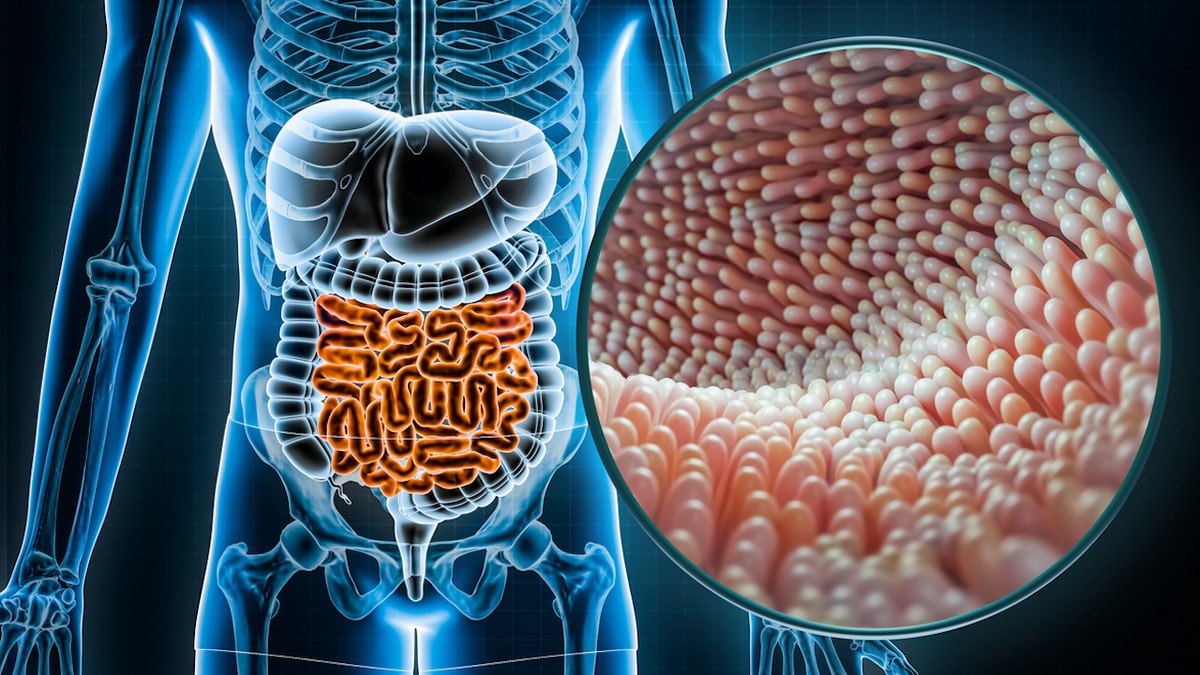
The micronutrient increased levels of the bacterium Bacteroides fragilis, which has been shown to improve cancer immune response. (iStock)
“By exploring new ways to boost the immune system’s ability to recognize and destroy cancer cells, researchers can develop more effective and targeted treatments, ultimately improving patient outcomes and survival rates.”
Based on the findings of this study, Farooq said he recommends people make sure their vitamin D levels are adequate, “as part of a comprehensive approach to potentially lowering their risk of cancer.”
CLICK HERE TO SIGN UP FOR OUR HEALTH NEWSLETTER
“While more research is needed to fully understand the relationship, maintaining optimal levels of vitamin D is generally beneficial for overall health and may contribute to reducing cancer risk,” he added.
Studies in humans are needed to learn more about the link between vitamin D and cancer immunity, the researchers acknowledged.
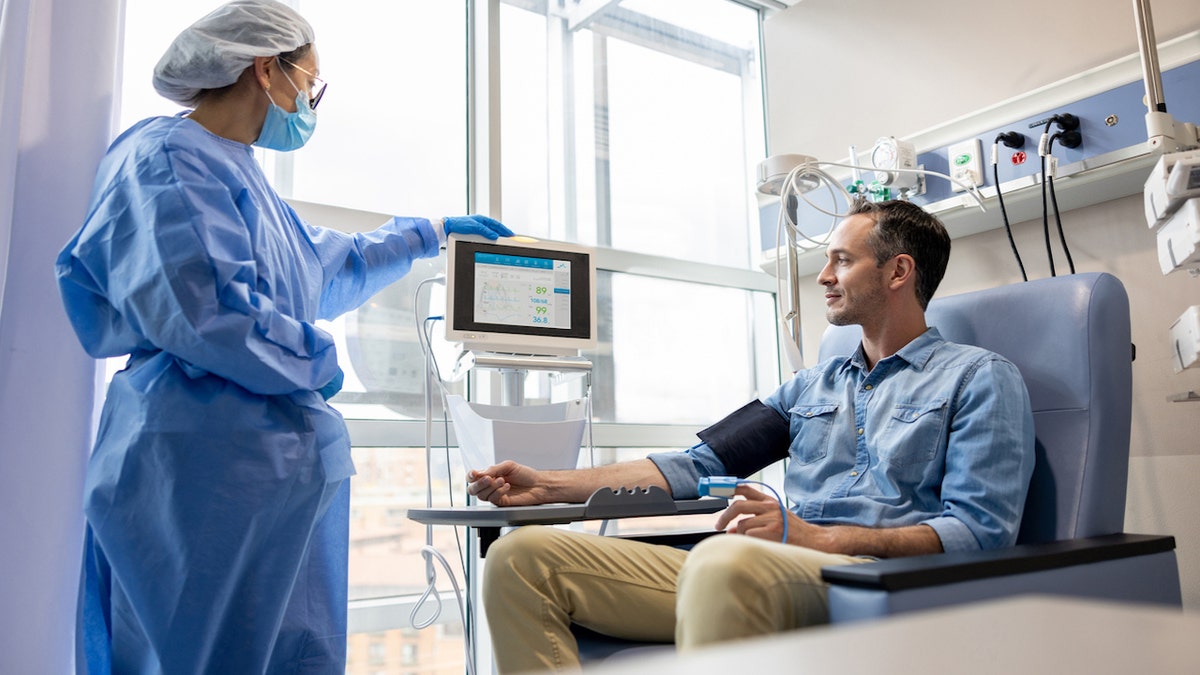
Vitamin D has been linked to improved responses to cancer immunotherapy and greater immunity to new tumor development. (iStock)
“More work is needed before we can conclusively say that correcting a vitamin D deficiency has benefits for cancer prevention or treatment,” said Sousa.
Farooq echoed the need for more research.
“Moving forward, I would like to see further research delve deeper into the mechanisms underlying the interaction between Vitamin D, the microbiome and cancer immunity,” he said.
Fox News Digital reached out to the study researchers for comment.
For more Health articles, visit www.foxnews.com/health.
Health
Cancer trends revealed, including most common types of the disease and biggest risk factors
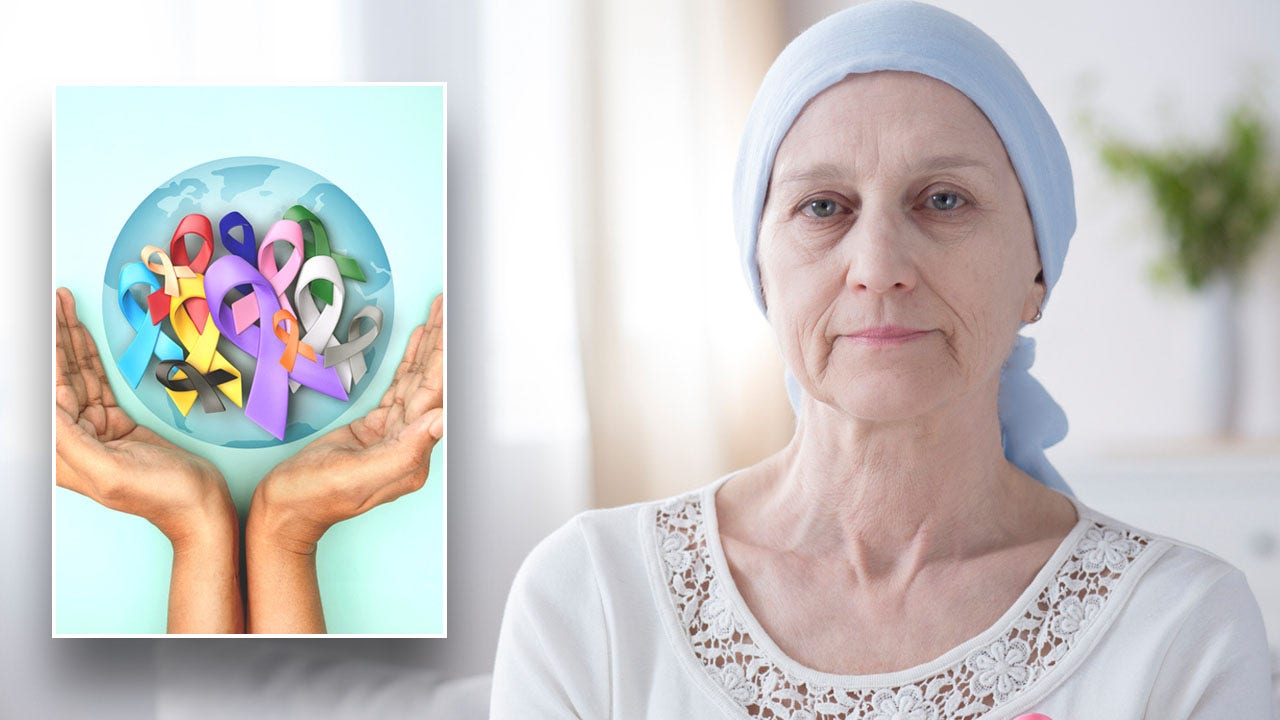
Almost 40% of Americans will receive a cancer diagnosis at some point in their lifetime — but certain types are more common than others, statistics show.
USAFacts, a Washington-based nonprofit that compiles government data and reports on it, took a deep dive into the latest cancer data to identify trends — and shared the results with Fox News Digital.
Of the 1.96 million new cancer cases in 2023, half were made up of five types: breast cancer (15%), prostate cancer (15%), lung and bronchus cancer (12%), colorectal cancers (8%) and all other types (50%).
CANCER CAUSES: THESE 10 HIDDEN CARCINOGENS CAN RAISE THE RISK, ACCORDING TO AN ONCOLOGY EXPERT
Among the 609,820 cancer deaths in 2023, nearly half were made up of lung and bronchus cancer (21%), colorectal cancers (9%), pancreatic cancer (8%) and breast cancer (7%).
The remaining 55% of deaths were attributed to other cancers.
Almost 40% of Americans will receive a cancer diagnosis at some point in their lifetime — but certain types are more common than others. USAFacts, a Washington-based nonprofit that compiles government data and reports on it, studied the numbers and shared trends with Fox News Digital. (iStock)
While cancer cases have risen overall due to a growing population, the share of people getting diagnosed and dying from the disease has decreased.
“Between 2000 and 2019, the incidence rate — or the rate of new cancer cases per 100,000 people — declined by 5.4%, while the annual mortality rate fell by more than 26%,” the report stated.
The share of people getting diagnosed and dying from cancer has actually decreased.
“This suggests improvements in cancer prevention, detection and treatment,” Dr. Brett Osborn, a Florida neurologist and longevity expert, told Fox News Digital in a statement.
Osborn was not involved in the report, but commented on the findings.
Here are five standout observations.
1. Gender-specific risk
As of 2019, men were about 15.4% more likely to receive a new cancer diagnosis and 37.5% more likely to die from the disease than women.
That gap has narrowed since 2000, however, when the cancer incidence rate was more than 37% higher for men.
FOODS TO EAT, AND NOT EAT, TO PREVENT CANCER, ACCORDING TO A DOCTOR AND NUTRITIONIST
For men, the most common cancers are prostate, lung and colorectal cancers, the USAFacts report stated.
Those types made up 50.8% of new cancer cases and 45.9% of cancer deaths in 2023 among males.
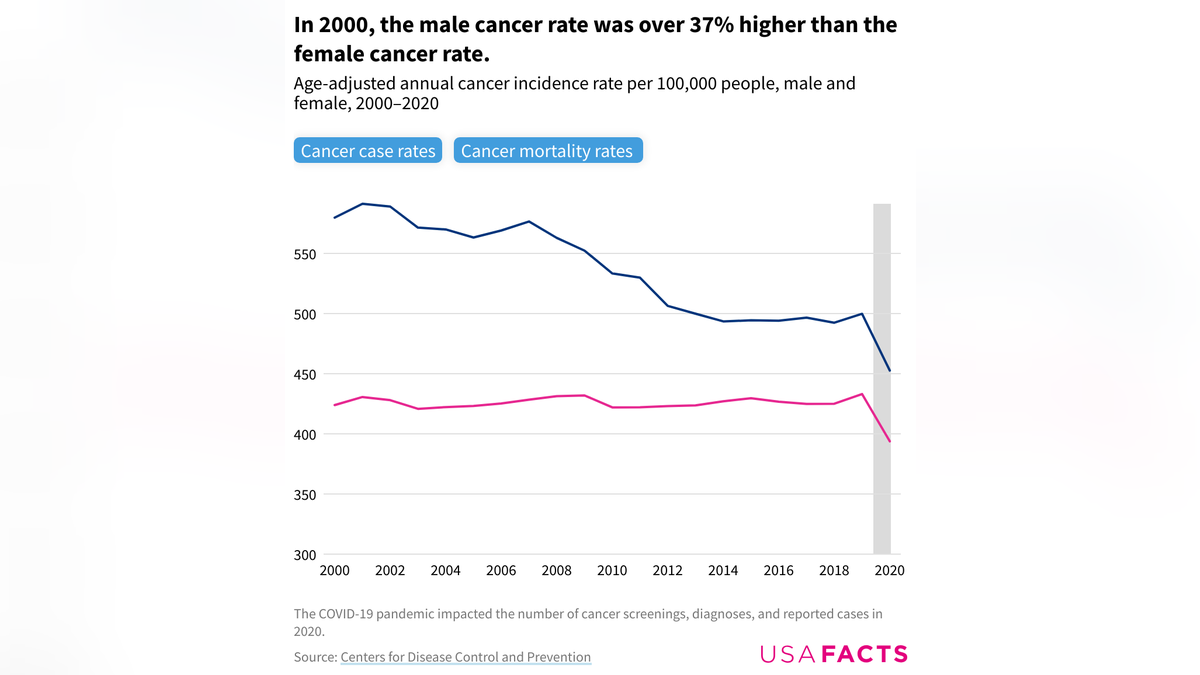
As of 2019, men were about 15.4% more likely to receive a new cancer diagnosis and 37.5% more likely to die from the disease than women. (Centers for Disease Control and Prevention )
Among women, the most prevalent types are breast cancer, lung cancer and colorectal cancer.
Those three types comprised 54.6% of new cancer cases and 50.1% of cancer deaths in 2023 for females.
2. Cancer rates across ethnic groups
White Americans have the highest rate of new cancer diagnoses, followed by non-Hispanic Black Americans, the report stated.
Among cancer deaths, however, non-Hispanic Black Americans are at the highest risk.
SOME BREAST CANCER PATIENTS COULD BE AT RISK OF ANOTHER TYPE OF CANCER, STUDY REVEALS
Non-Hispanic Asian/Pacific Islander Americans have the lowest risk of diagnosis and mortality.
Overall cancer incidence rates have dropped between 2000 and 2019 for every group except American Indian/Alaska Native people, who experienced a nearly 35% increase in diagnoses.
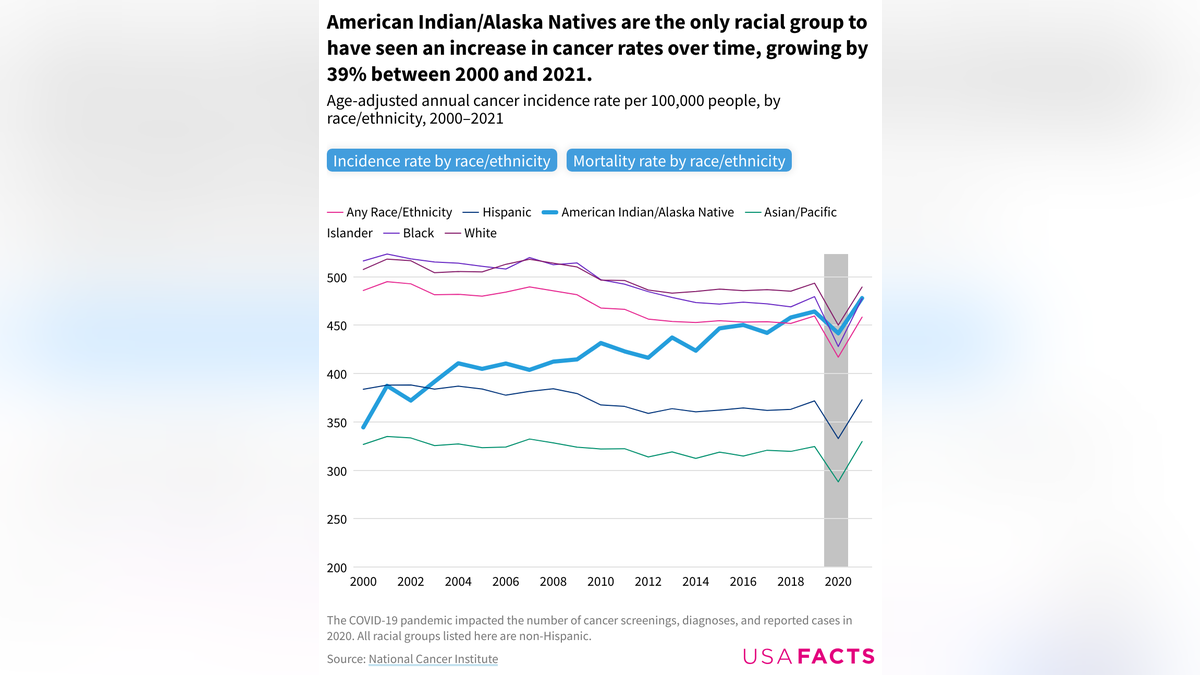
White Americans have the highest rate of new cancer diagnoses, followed by non-Hispanic Black Americans, the report stated. (National Cancer Institute)
“While the reason behind these disparities is hard to pin down, contributing factors include access to health care, environmental conditions, lifestyle behaviors and genetics,” the report states.
3. Cancer survival rates
The five-year cancer survival rate has risen, going from 63.5% in 2000 to 68.4% in 2015 — and is expected to continue its upward trend.
“This improvement is credited to better prevention, early detection and advancements in treatment,” according to Osborn.
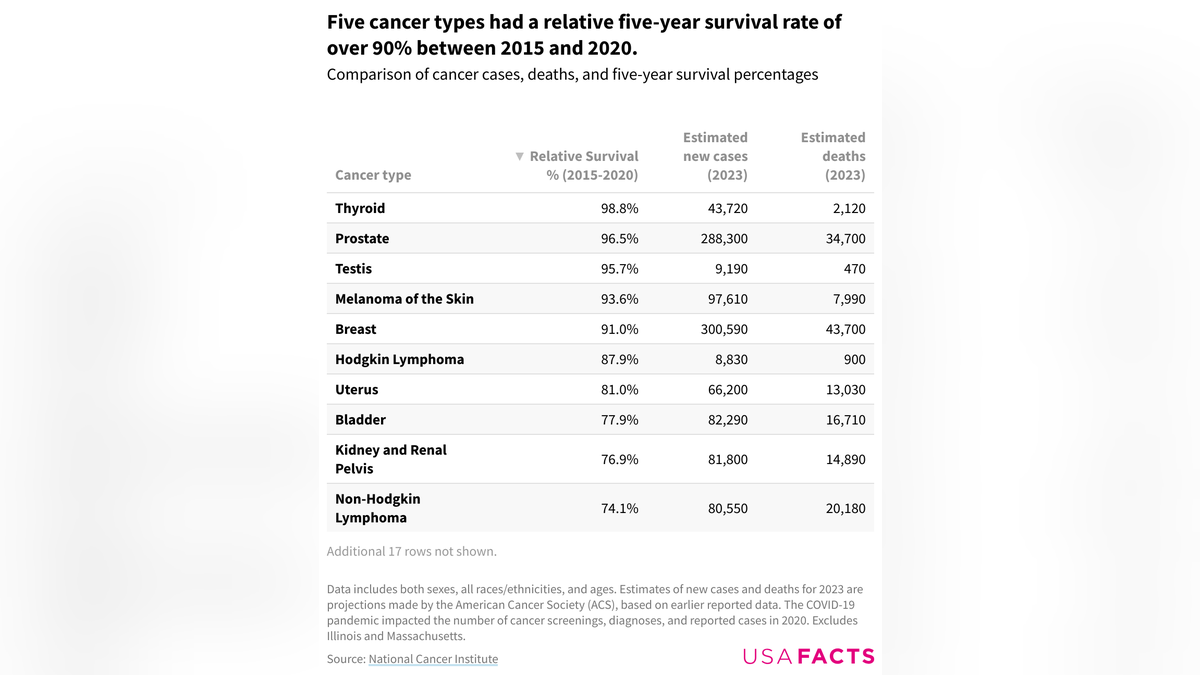
The five-year cancer survival rate has risen, going from 63.5% in 2000 to 68.4% in 2015, and is expected to continue its upward trend. (National Cancer Institute)
Survival rates vary by cancer type.
The cancers with the highest five-year survival rate are thyroid (98.8%), prostate cancer (96.5%), testicular cancer (95.7%), skin cancer (93.6%) and breast cancer (91.0%).
CANCER RATES RISING IN YOUNG PEOPLE DUE TO ‘ACCELERATED AGING,’ NEW STUDY FINDS: ‘HIGHLY TROUBLING’
“It should be noted that estimated cancer deaths in 2023 do not reflect the five-year survival rate between 2015 and 2020, as deaths in 2023 may result from cancer cases diagnosed prior to the five-year window,” the report stated.
4. Average age of cancer diagnosis
Age is the most prevalent risk factor for a cancer diagnosis, according to the report.
Diagnosis rates rise steadily for each decade of life.
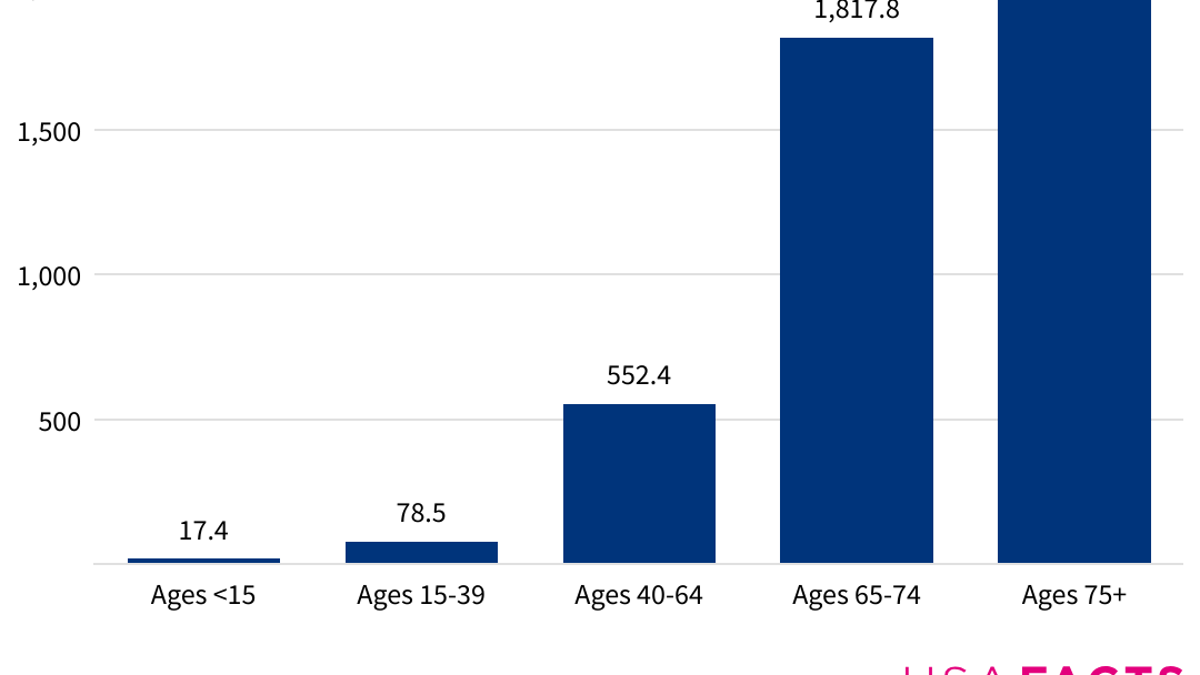
Age is the most prevalent risk factor for a cancer diagnosis, according to the new report. (National Cancer Institute)
The average age of diagnosis is 66 and the average age of death is 72, according to data gathered by the National Cancer Institute (NCI) between 2016 and 2020.
The disease can occur at any age, however — which is why experts recommend early screenings to reduce mortality rates.
5. Importance of guarding against ‘complacency’
Despite the improvements in cancer incidence and mortality rates, Osborn warned that Americans “should not be lulled into complacency.”
CLICK HERE TO SIGN UP FOR OUR HEALTH NEWSLETTER
“According to 2024 data from the American Cancer Society, the incidence of six of the most common cancers – namely those related to excess body weight, such as endometrial, liver, kidney, pancreas, colorectal and breast – are on the rise and may temper the declining mortality rate in the future,” he warned.
Rising obesity rates in the U.S. are a direct cancer driver, Osborn indicated.
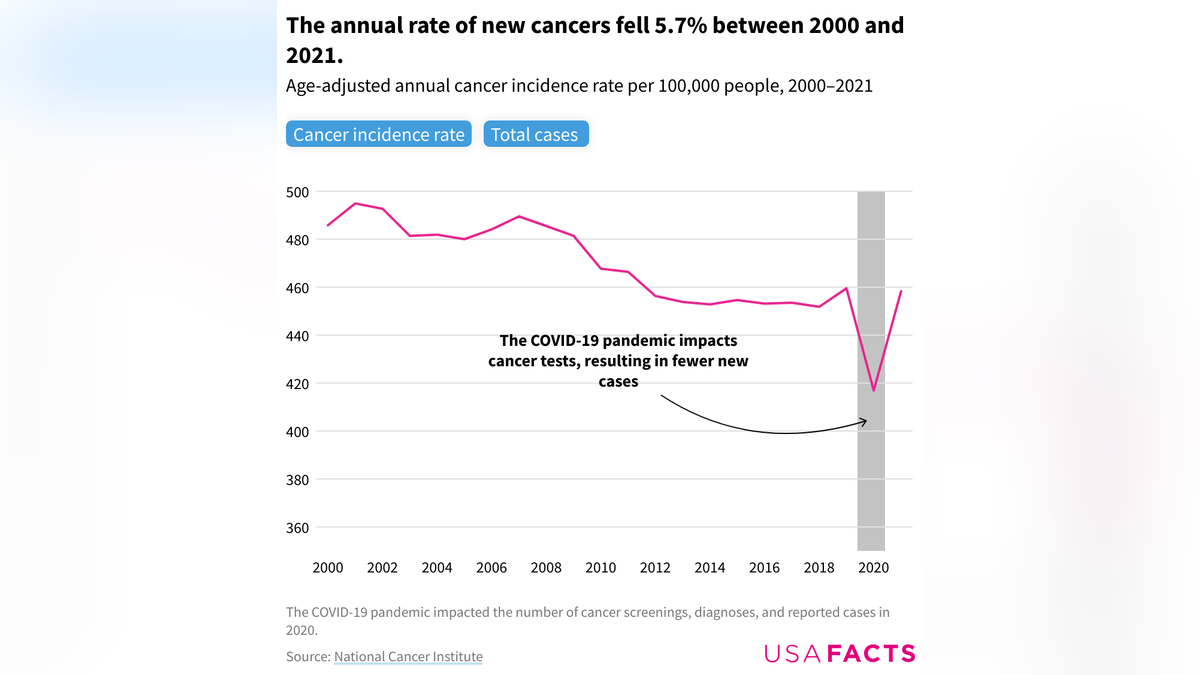
While cancer cases have risen overall due to a growing population, the share of people getting diagnosed and dying from the disease has decreased. (National Cancer Institute)
“It is estimated that more than two in five adults (42.4%) have obesity – a gateway disease to cancer — according to recent data from the National Institute of Diabetes and Digestive and Kidney Diseases,” said Osborn.
“One can only hope that we are not headed in the wrong direction.”
“Unless the tide is turned and the obesity epidemic is addressed, the observed reduction in the annual rate of new cancers and associated mortality will slow and potentially be extinguished,” he continued.
“One can only hope that we are not headed in the wrong direction.”
USAFacts compiled its report using data from the NCI, the U.S. Centers for Disease Control and Prevention (CDC) and the National Center for Health Statistics (NCHS).
For more Health articles, visit www.foxnews.com/health.
-

 News1 week ago
News1 week agoIs this fictitious civil war closer to reality than we think? : Consider This from NPR
-

 World1 week ago
World1 week agoShipping firms plead for UN help amid escalating Middle East conflict
-

 Politics1 week ago
Politics1 week agoICE chief says this foreign adversary isn’t taking back its illegal immigrants
-

 Politics1 week ago
Politics1 week ago'Nothing more backwards' than US funding Ukraine border security but not our own, conservatives say
-

 News1 week ago
News1 week agoThe San Francisco Zoo will receive a pair of pandas from China
-

 World1 week ago
World1 week agoTwo Mexican mayoral contenders found dead on same day
-

 World1 week ago
World1 week agoBrussels, my love? The EU single market is not sexy enough for voters
-

 Politics1 week ago
Politics1 week agoRepublican aims to break decades long Senate election losing streak in this blue state














